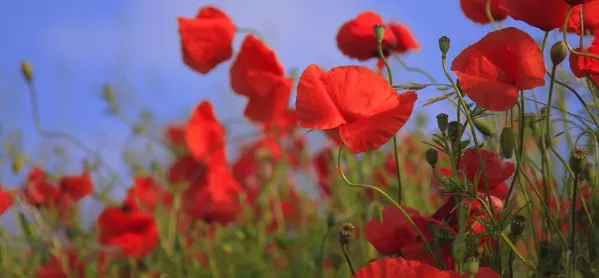- Home
- ‘For Remembrance Day, celebrate creativity in schools’
‘For Remembrance Day, celebrate creativity in schools’

One hundred years on from 1918, it seems a fitting moment to celebrate humankind’s creativity. War represents destruction, the antithesis of creativity. The end of the First World War marked the start of the Child Art Movement, a holistic and arts-rich approach to learning championed by educationalists of the time. The year 1918 was, therefore, a key moment in the deep seam of education that has always concerned itself with what it is to be creative. It was a powerful response to the inhumanity of the time.
Fast-forward to today and that same creativity is as important as ever: it’s an expression of our uniquely human nature through the exercise of our imagination, curiosity and capacity for generating new ideas.
In our deeply uncertain and fast-moving times, there are other reasons for valuing creativity. It is, according to the World Economic Forum, with complex problem-solving and critical thinking, one of the three most important skills people will need to be employable. Acclaimed psychologist Mihaly Csikszentmihalyi has shown how exercising our creativity dramatically improves our wellbeing and happiness. Closer to home, in a large-scale review, researchers Leslie Gutman and Ingrid Schoon identified a number of key areas that were particularly associated with positive outcomes for young people, one of which was creativity.
Look at education systems across the world and creativity is increasingly appearing on national curricula. Australia, Finland, New Zealand, Scotland and Singapore are just five examples of many countries - the Brookings Institute suggests that there are 51 - which are explicitly specifying creativity as a required curricular element. In 2021, the Programme for International Student Assessment (Pisa) will, for the first time, test 15-year-olds on their creative thinking ability. I’m lucky enough to be co-chairing the Organisation for Economic Cooperation and Development’s strategic advisory group through this process.
Creativity versus the destruction of war
The importance of the twin pillars of literacy and numeracy is widely acknowledged. They are important but not sufficient though. We need much more. There is a very real sense in which creativity is a third pillar on which all civilised, peaceful human endeavour rests. It is, as Andreas Schleicher, the leader of the OECD’s Education Directorate has argued, a core literacy for our times.
Perhaps the most important feature of creativity is that it is subject-neutral. It can be found in the arts and the sciences, within mathematics and geography, in any subject discipline taught in schools.
It’s with all of this in mind that 14-18 NOW (the organisation behind the First World War centenary arts commissions), along with artist Bob and Roberta Smith, called on 16- to 18-year-old students across the UK to take part in Make Art Not War. It’s a project that asks students to respond to the question “What does peace mean to you?” through their own creative work across any media.
Among the 14-18 NOW resources is a gallery of highly accessible and provocative short films by artists including Jeremy Deller, Rachel Whiteread and Yinka Shonibare. Each offers a window into the artist’s own creative habits as well as their own reflection on the question “What does peace mean to you?”
Make Art Not War seeks to encourage young people to develop and nurture essential creative skills that are fundamental to wider learning and are matched to future social and economic demands.
The project also offers brand new curriculum resources designed specifically for assessment within A-level English, art and design and geography. A bespoke artist mentoring programme rolls out this autumn across the leadership colleges at the National Skills Academy, and targeted curriculum materials have been designed for inclusion in UAL Awarding Body Diplomas, A levels and the Extended Project Qualification, enabling over 50,000 students as the programme unfolds.
As Armistice Day nears, we should all remember that we live in peace today, but war is never far away. Siegfried Sassoon memorably wrote:
Mute in that golden silence hung with green,
Come down from heaven and bring me in your eyes
Remembrance of all beauty that has been,
And stillness from the pools of Paradise.
When I read these lines I think of the heaven that is within us all, our creative, peace-loving natures, and I dream of a time in which, alongside all the other valuable things we do in education, creativity reasserts itself and sits at the very centre of school life.
Bill Lucas is professor of learning at the University of Winchester, co-chair of the group advising Pisa on its 2021 Creative Thinking Test and academic adviser to the 14-18 NOW education programme. With Ellen Spencer, he is the author of Teaching Creative Thinking: developing learners who generate ideas and can think critically.
The Make Art Not War resources and films can be accessed here.
Keep reading for just £1 per month
You've reached your limit of free articles this month. Subscribe for £1 per month for three months and get:
- Unlimited access to all Tes magazine content
- Exclusive subscriber-only stories
- Award-winning email newsletters